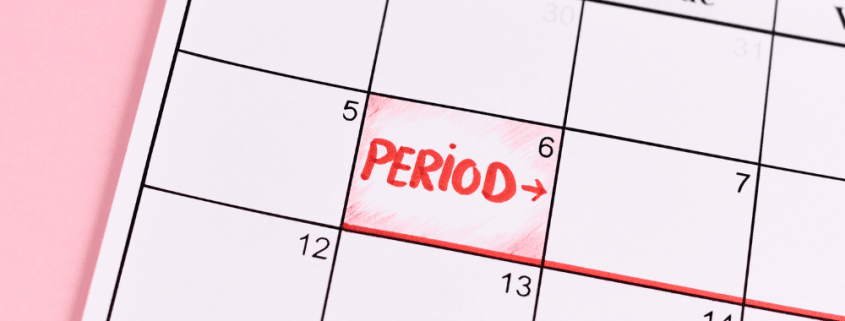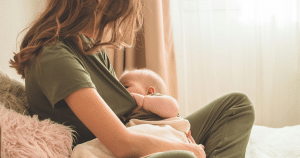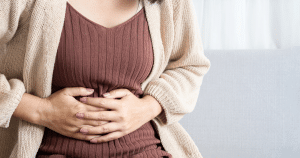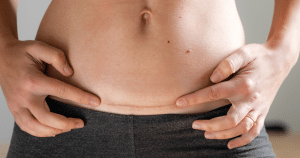What to expect from the first period postpartum
Congratulations on the birth of your baby! Now that your little bundle of joy has arrived, you’ll probably have lots of questions about what happens now. In this article, we’ll be telling you what to expect from the first period postpartum.
This article includes:
- When do you get your period after birth?
- Period or postpartum bleeding?
- What to expect from the first period postpartum
- First period after baby, longer than 7 days
- First period after giving birth, how long should it last?
- First period after giving birth with breastfeeding
- First postpartum period after c-section
- When to seek advice postpartum period
- Can you get pregnant before your period returns?
When do you get your period after birth?
We can understand why you’d be wondering, when do you get your period postpartum? Unfortunately, there is no real way of knowing exactly when your periods will come back after giving birth.
There are various factors that can affect your period’s return, and we’ll go into more detail in this article. Breastfeeding can have an impact on your periods, as can birth control options and your general health.
Period or postpartum bleeding?
After giving birth, you may experience post-birth bleeding, also called lochia. Lochia is a vaginal discharge that can begin heavy and bright red but usually gets lighter over time. Lochia is usually accompanied by pains similar to those you experience during a period.
Lochia is more watery than a period. You should use sanitary or maternity pads rather than tampons to reduce the risk of infection. Your postpartum bleeding, or lochia, will usually reduce over time, changing to a brown colour before stopping altogether.
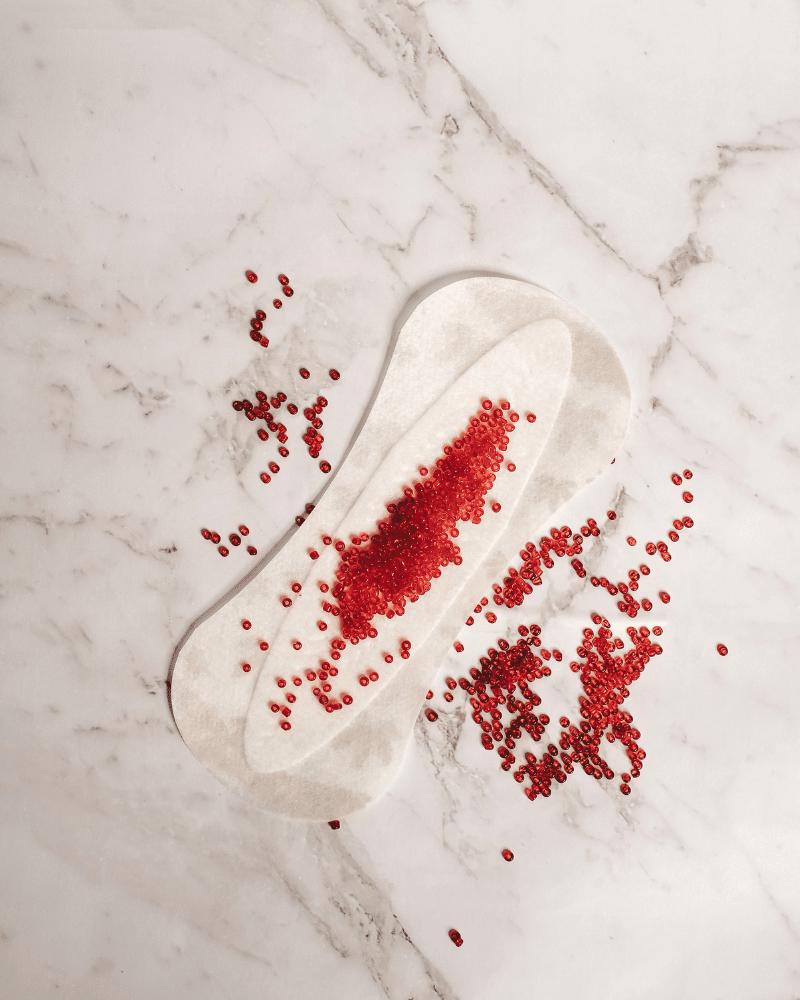
What to expect from the first period postpartum
Some may experience very little changes to their periods compared to before pregnancy. Others may experience irregular periods. This may only be for a short while until your menstrual cycle regulates.
The signs of irregular periods include:
- Bleeding for longer than before giving birth
- Your menstrual cycle may last up to 45 days rather than the average of 28 days
- You may experience light or heavy bleeding
Many women report the first period being more intense. This means that you may have more painful periods and worse cramps. This generally occurs after pregnancy due to more uterine lining being shed.
Don’t forget that you can access support if you feel worried about anything after giving birth. Your midwife will perform multiple visits where you can discuss things like your period after pregnancy.
You should be aware that your periods may also change due to hormonal or non-hormonal birth control. You can always chat with a nurse if you become worried about your periods.
First period after baby, longer than 7 days
Some women may confuse lochia with their first period. Lochia can continue for a few weeks before it finishes. If you experience clotting during lochia, you should seek medical advice.
Some women experience changes to their period postpartum. These can include the period becoming heavier than normal or lasting longer than they did previously. Some women may also experience periods becoming lighter or not lasting as long. Unfortunately, there’s no real way of knowing how your body will react when your period starts.
First period after giving birth, how long should it last?
Hormone changes and changes to the uterine lining mean there’s no way of knowing how long your period will last. When your periods start, they may be no different to before, or they may be longer or shorter.
A typical period lasts anywhere between 2 and 7 days, but they can vary. Seek medical advice if you become worried about your periods. You should also seek advice if you notice clotting. This advice applies to your period and to any lochia that you experience post-birth.
First period after giving birth with breastfeeding
Usually, those who exclusively breastfeed may wait longer before their first period arrives. In contrast, those who combine breastfeeding and formula could have their period within just six weeks after giving birth.
This is because the body produces a certain hormone when breastfeeding that can help to suppress periods and ovulation. When breastfeeding, your period may not arrive until the 6-month mark. Read our blog: Can you get pregnant while breastfeeding?
Some women choose to use breastfeeding as part of their birth control. However, this may not be a totally effective method unless the criteria are met perfectly. It is usually recommended to use birth control if you do not want to become pregnant.
Before leaving the hospital, the nurses may discuss hormonal or non-hormonal birth control. Even though it might be the last thing on your mind, it’s important to think about it.
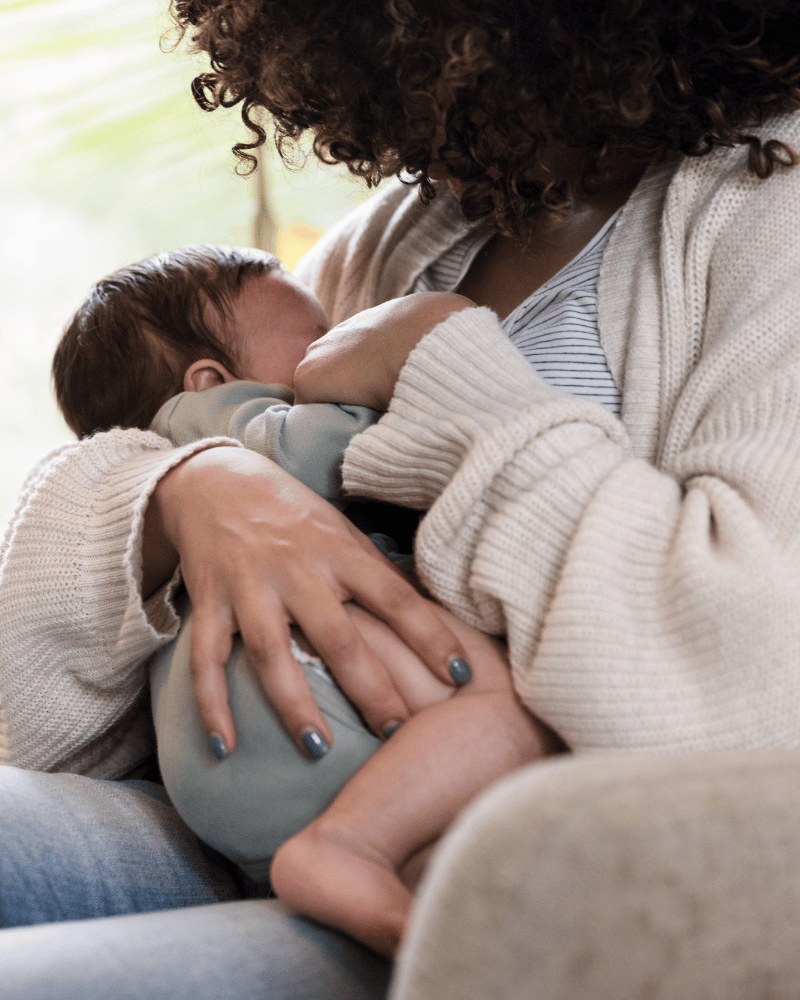
LAM
Breastfeeding to prevent pregnancy is usually referred to as the lactational amenorrhea method or LAM.
This relies on you exclusively breastfeeding, so not using any formula or giving the baby a bottle feed. You must be less than six months postpartum and be feeding every 4 – 6 hours. Not meeting the criteria reduces the chances of preventing pregnancy.
You can continue to produce breast milk for months after your baby is born. Breast milk supply after 6 months may be the same as before, but it can no longer prevent pregnancy. At around six months, most parents start to feed the baby solid foods.
First postpartum period after c-section
It’s very important that you rest after having a c-section. A c-section is a big surgery. Before you leave the hospital, you will be told the best ways to care for your wound. It’s important that you or a loved one check the appearance of the wound regularly. This can ensure that there are no signs of infection.
You can expect to get your first postpartum period six to eight weeks after having a c-section. Having a c-section has no bearing on when your period will arrive. This means it would typically be the same regardless of whether you have a vaginal birth or a c-section. Breastfeeding is the main reason why your period could take longer to come back.
When to seek advice for postpartum period
Knowing what to expect from your period can be tricky. After all, periods are different for everyone and may be different when compared to your pre-pregnancy periods. There are some signs that you should seek medical advice for.
- Feeling feverish
- Bleeding for more than seven days consecutively
- Heavy bleeding (soaking through more than one pad every hour)
- Large blood clots
- Severe cramping
You should seek medical advice from a doctor immediately if you notice these signs. While these signs may not be something to worry about, it’s always best to get checked over.
You should also seek advice if you continue to experience painful periods. Your postpartum periods may change, but you may be able to receive advice on this.
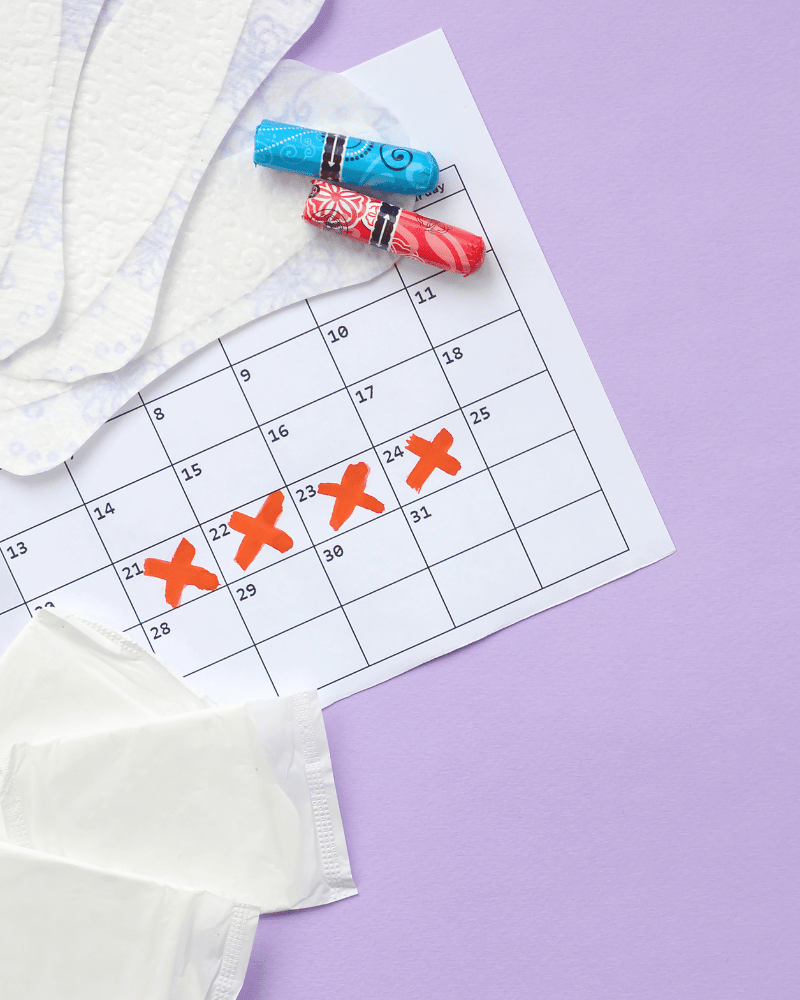
Can you get pregnant before your period returns?
It turns out you could actually get pregnant. This is because you may ovulate before the period returns. Post-partum can bring many changes to your menstrual cycle.
Ovulation occurs when your ovary releases an egg. If the egg is fertilised, it will implant itself into your womb. If the egg does not become fertilised, it will either be reabsorbed into the body or released.
You should take a pregnancy test if you suspect you are pregnant. This is the only way to know for sure. Make sure that you read all of the information provided with the test. The instructions will inform you of the right time to take the test. Taking the pregnancy test too early may result in a false negative.
Some women may not get their period for months after giving birth, others will be bleeding within six to eight weeks. There is no way of knowing what to expect from your first period after pregnancy. There is lots of support and advice available if you need it.
We hope this article has been useful regarding your first period after pregnancy, and congratulations on your new arrival!
Hey there, I’m Abigail!
In 2022, I graduated with a First Class Degree in Marketing and since then, I have been working as a blogger and Marketing Assistant. Before heading to university, I also achieved a BTEC in Children’s Play, Learning and Development.
I have been blogging for over four years and have covered many topics during this time. My focus has been on pregnancy, babies, sleep and baby name ideas.
I am passionate about learning new things and helping others. I hope that you find my blogs useful and informative. See you in the next article!



